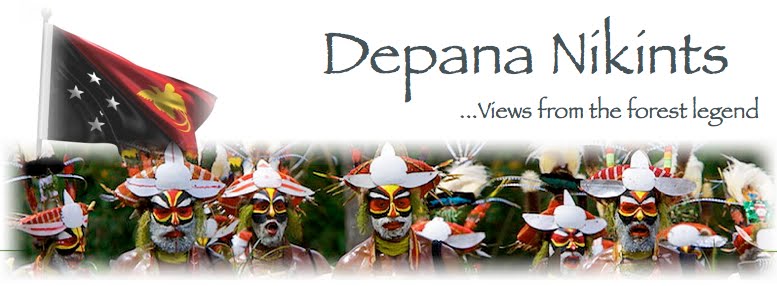Land is the most important asset today. Land is worth more than any other mineral resources in the world, because, everything is centered on it. Melanesians got it right from the beginning! Papua New Guineans from the highlands to the coasts understood the value of Land long before western civilization, they fought battles to protect and gain control of land for hunting, making gardens, and spiritual cultivation. They had low population compared to today, however, despite their smaller population; they managed to maintain control over vast landmasses and forests.
When the white-men set foot on the island of New Guinea, they initially thought, that the huge masses of land areas and forests belonged to no one. But that was not the case; they had to encounter fierce warriors apart from the rugged terrains and tropical diseases. The whites were able to succeed on 3 factors;
- Skin Color and Race - When the natives saw the whites, they thought, they (White-men) were ghosts or spirits. Because of a culture deeply rooted in spiritual believes, the resistance subsided because of the white-men's color.
- Use of Christian Religion - Western civilization's success can never be possible without the use of Christianity. Missionaries were agents of colonization in PNG, as they influenced and converted the natives.
- Use of modern weapons - Guns, bullets, swords, daggers etc put the white-men ahead of the natives' spears, bows and arrows.
The first traits of land grab in PNG were initiated by missionaries through the exchange of salt, tobacco and axes. That was how the Catholic and the Lutheran Churches took over native lands and started plantations. There were also signed agreements between the primitives and the whites for leases in the early colonial and missionary era that displaced the natives today. A Classic example is the lands belonging to the natives Kananam's taken over by the Catholic Church for the establishment of their Mission's headquarters (Alexishaffen) and plantations (Vidar). When the 99 year lease lapsed, the land went to the government and to the RD Tuna Ltd (a Filipino fishing company). Further transactions took place which put the land in the hands of the project developers of the Pacific Marine Industrial Zone (PMIZ). The Kananams and Rempi's are displaced and thrown out of the best lands. There are many situations like this in the other parts of PNG.
The land grab is intensifying because of shortage arable land for food plantations and agric-industries thirsts for new lands for expansion.
In October 2008, GRAIN released a report on the new trend in landgrabbing spurred on by the food and financial crises. A large number of governments and corporations are out scouring the globe right now in search of productive farmland to buy or to lease for offshore food production. For governments, like those of the Gulf States or China, such "farming abroad" schemes are meant to provide for their own country's food security, over a longterm period. Corporations, on the other hand, are looking for shorter term payoffs after the recent meltdown of financial markets. In all cases, control over land is being handed over to foreign investors who will produce food for export. Most of this new landgrabbing is taking place in Africa and Asia, but also in fertile regions of Eastern Europe and Latin America. (http://www.grain.org/landgrab/)
This is a dangerous trend – the ruthless capitalists are ruling the world in the name of economic development and profits. Capitalists see measure everything against the dollar, to them, money is their primary focus. The Melanesians view land as the centre of life – like a mother to her baby.
Melanesian saw the value of land even before formal land valuation was introduced in Papua New Guinea. In fact, the valuation of land in the Melanesian perspective is holistic – it touches into the essence of one’s life and existence, believes, traditions, wealth, security, identity and spiritual.
It would have been a biggest liability for PNG, if the control and ownership of all the land in PNG was in the hands of the government because, we have almost 75% illiteracy and 85% survive on subsistence living. The Customary Land Tenure System in PNG is directly or indirectly minimizing problems such as starvation, food riots, coups, assassinations, terrorism, civil wars and extreme levels of poverty.




No comments:
Post a Comment